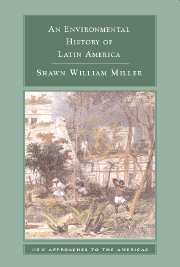Book contents
- Frontmatter
- Contents
- List of illustrations
- Acknowledgments
- Map 1 Middle America
- Map 2 South America
- Introduction: Props and Scenery
- 1 An Old World Before It Was “New”
- 2 Nature's Conquests
- 3 The Colonial Balance Sheet
- 4 Tropical Determinism
- 5 Human Determination
- 6 Asphyxiated Habitats
- 7 Developing Environmentalism
- Epilogue: Cuba's Latest Revolution
- Suggested Further Reading
- Index
2 - Nature's Conquests
Published online by Cambridge University Press: 05 February 2015
- Frontmatter
- Contents
- List of illustrations
- Acknowledgments
- Map 1 Middle America
- Map 2 South America
- Introduction: Props and Scenery
- 1 An Old World Before It Was “New”
- 2 Nature's Conquests
- 3 The Colonial Balance Sheet
- 4 Tropical Determinism
- 5 Human Determination
- 6 Asphyxiated Habitats
- 7 Developing Environmentalism
- Epilogue: Cuba's Latest Revolution
- Suggested Further Reading
- Index
Summary
And still the horses had not sated their thirst, to the frightening astonishment of the Indian women; and they said to the Spaniards, “in truth, our lords, if these animals eat so much as they drink, there is not enough in all of our lands that can sustain them.”
Columbus and his colleagues, I have suggested, did not discover a new world in America; they happened upon another old world. The discoverers did, however, consummate an abrupt, forced marriage between two hemispheres that after decades of gestation and a prolonged, difficult labor gave birth to something new. A wide variety of peoples hailing from three major landmasses – Eurasia, Africa, and America – melded to form cultures that were racially and culturally distinct from anything that had come before. Of this crucible was born Latin American civilization, a cultural hybrid. The Eurasian and African arrivals, however, carried more than cultural baggage; they also impregnated America's landscapes with new plants, animals, seeds, and germs, making of the Americas something of an ecological amalgam. The Old World's biological baggage, much of it stowaway, muscled in and grafted itself on to the lives and landscapes of America's existing ecological foundations. By the hundredth anniversary of this complicated union, the title “New World” finally made an apt description of both the cultural and natural consequences of the penetration of one hemisphere by another.
- Type
- Chapter
- Information
- An Environmental History of Latin America , pp. 49 - 76Publisher: Cambridge University PressPrint publication year: 2007

